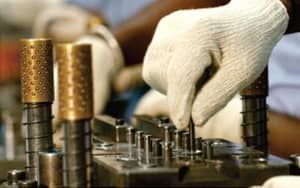Despite the uncertainties over Brexit and the Trump – China trade war, the car industry is expanding at a fast rate. Global sales are growing at around 2.8% worldwide per year. If predictions are correct, this his will result in over a 100 million automobiles sold by 2020.
Greater China is where most of this growth comes from. That said, both North America and Europe are set to see significant growth figures. South America meanwhile, is set to outstrip its North American cousin and see a consistent growth rate of 1.7%.
From a manufacturer perspective, Toyota had the highest revenue in 2017 at $265.17m USD. This was closely followed by Volkswagen at $260.03m USD, with Daimler coming in at third with $185.24m USD. The tenth was Nissan at a $107.87m USD. If predictions are correct, this healthy growth rate should see many of the top ten manufacturers realise a rise in revenue as more sales are made. Whether the top ten will remain in the same order remains to be seen.
Investing in the automotive sector
As you can imagine growth industries result in opportunities. According to PWC, many original equipment manufacturers (OEM) are turning to Silicon Valley to develop technology that their customers want. As vehicles rely increasingly on motherboards rather than axle grease, this makes a lot of sense. That said, automotive sector companies from Bavaria and other locations are also taking advantage of investing in the automobile industry.
The driverless car is the ultimate goal behind Silicon Valley’s involvement with the car industry. Some would argue that this is already a reality with Tesla and Google releasing their own driverless technology.
Google’s driverless cars have travelled over 1.5m actual road miles with only a handful of accidents. According to the company, these accidents were the fault of human drivers and had little or nothing to do with their technology.
Apple’s Project Titan is the name given to their own driverless car efforts. With so many big players involved, there has to be a market for the technology. Although Google has stated it does not want to enter the driverless car market by releasing a model of its own, Apple has made no such statements. Could an I-car be on showroom floors in a few years time? It is quite possible given the evolution of the company.
The chances are that both Google and Apple see that the challenge for traditional car makers will be keeping up with Tesla. If the electric car evolves to a point where a vehicle can achieve 350 miles on one charge, then this will be a significant threat to petrol and diesel fuelled cars. Should Tesla, in addition, perfect a reliable and capable driverless car system many traditional manufacturers will see a fall in sales.
Will toxic emissions result in toxic sales for the car industry?
It is these kinds of challenges that traditional car makers have to face to ensure the sales growth predicted remains on track. Consider how Volkswagen’s reputation was almost destroyed in the U.S when it transpired they built their cars to defeat NOx emissions, and it is clear that customers are looking for cleaner cars.
In the UK for example, Diesel car sales have dropped 20%. Some would argue that this is over Brexit concerns but the likelihood is that it is down to environmental and human health impacts which are influencing this trend. Automotive OEMs are constantly improving upon the vehicle software platform solutions they install, which collect and report on vital data that includes fuel consumption patterns.
Smaller automotive businesses
The smaller automotive business will also be affected by the challenges of its global counterparts. Right now it is quite easy to get hold of car parts for most models from thermostats to spark plugs. Trends in demand will still exist but parts will be more electronic in nature. Right now, certain parts are always in demand. Emissions sensors, especially lambda sensor in quality are sought after.
Going forward, parts like this might become obsolete. Smaller auto parts businesses will be stocking motherboards and complex battery systems rather than carburettors and similar parts.
Mechanics from the self-employed to ones that work in dealership could well be swapping out parts that resemble computer parts to what we currently see under the bonnet of an Audi in the near future.
The car industry at the moment is in a good place with healthy markets seen in most regions of the world. It has picked up since the crash and is now moving forward with solid growth predicted. Household name car manufacturers will have to adapt and develop if they are to survive, however, as it is clear their customers want cleaner vehicles and ones which are tech savvy.
Partnerships with technology companies such as Google and Apple are inevitable. In a few years, you could be sitting in a car that is driving itself running silently on batteries, than one where speed and steering are controlled by you and engine sounds and emissions are pumped out.






Leave a Comment